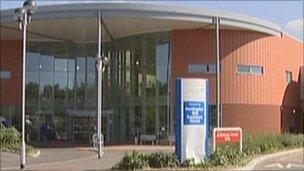Hinchingbrooke: Is Circle meeting its transformation targets?
- Published

Hinchingbrooke hospital in Cambridgeshire serves a population of about 160,000
When Circle started its "historic partnership" with Hinchingbrooke Hospital in Huntingdon, Cambridgeshire, on 1 February, it published a 16-point plan outlining how it intended to transform the hospital.
The private enterprise is the first to manage an NHS hospital, with the staff and assets remaining in state control.
The plan included cutting paperwork, giving staff greater autonomy, and appointing a chef from a Michelin-starred restaurant to cook the food.
Circle says this type of scheme is "the first of its kind", and everyone working at Hinchingbrooke was invited to take part in its creation.
Three months on, has Circle met its initial targets?
Performance
In February, Circle pledged to turn Hinchingbrooke - once labelled a "basket case" - into one of the top 10 best performers in England.
In about 12 weeks, Circle says the hospital has gone from the worst-performing to the top-performing hospital in Cambridgeshire for treating emergency patients within the national target of four hours.
The number of patients staying in hospital for more than 10 days dropped by 30% in February, and by 50% in April, although the demand for beds is generally greater in the winter months than in spring.
Circle claims that by allowing doctors and nurses to make more of their own clinical decisions, patients undergoing hip and knee operations have seen their hospital stay reduced from 5.6 days to 3.5 days.
It predicts these types of changes could lead to annual efficiency gains of £1.5m.
But Tracey Lambert, the Unison union's eastern regional head of health, warned against taking the figures at face value.
"There are only three accident-and-emergency units in Cambridgeshire, with the other two - Addenbrookes and Peterborough and Stamford NHS Trust - three to four times bigger and responsible for treating by far the majority of serious accidents and emergencies in the county.
"Hinchingbrooke had already made significant improvements in 2010 and 2011 before it was taken over by Circle, as a result of reforms made by successive NHS chief executives and their teams," she added.
Patient experience
Circle says all food is now fresh rather than frozen, and that 95% of ingredients are sourced from the local area.
The budget for patient food remains the same.
Circle says a system to speed up the investigation of serious incidents, called "stop the line", has been successfully introduced within the allotted three-month timeline, resulting in a 73% drop in the number of such occurrences by April.

Circle claims patient safety at Hinchingbrooke has improved markedly since February
The firm promised to post all patient feedback in a simple, unedited format on its website within six months.
So far four departments, including emergency care and radiology, have published patient views, and the amount of feedback collected has more than doubled.
Grievances however, include waits of more than three hours to be seen by accident-and-emergency staff, and in some cases patients claim basic hygiene standards were not observed - leaving one patient "somewhat surprised".
On average, 89% of people who submitted feedback would recommend the hospital to a friend.
Financial savings
Hinchingbrooke Health Care NHS Trust has an historic debt of nearly £40m, which under the NHS system it was struggling to repay.
On 3 May, it emerged that Circle would be able to keep the first £2m of any profit made, half of any profit between £2m and £6m, and a third of any profit above £6m.
But the hospital needs to make tough efficiency savings and generate more revenue if it is going to generate any surplus for Circle and begin to repay the debt.
The company says £1.5m of procurement savings have been identified by buying smartly, and fewer expensive temporary staff are being used.
Importantly though, Circle is negotiating with local GP groups and neighbouring hospitals to drive up the number of patients coming to Hinchingbrooke for planned operations.
This type of surgery, if done correctly and efficiently, could increase revenue.
Circle claims it is on target to make £10m in savings in the first year of the 10-year franchise arrangement, and on course to balance the books.
Unison's Ms Lambert says her members want Hinchingbrooke to be able to deliver high-quality services to its patients, but warns the Circle contract is still in its infancy.
"We are very concerned that if the company start to take profits out of the hospital, the quality of patient care will suffer. And in the longer term the hospital is still under a huge debt burden that will fall on the taxpayer."
'Clinical units'
During a series of workshops, staff at Hinchingbrooke revealed they wanted greater "ownership" of the quality of care, and to improve the experience patients had during their treatment.
The hospital was therefore split into two divisions, one dealing with planned in-patient operations and one for emergency medicine.
Within the divisions, a series of sub-teams known as "clinical units" have been created.
The initial aim was for the hospital to be split into sub-teams within three months.
So far the system has been implemented in just three areas: orthopaedics, gastro-intestinal medicine and operating theatres.
Circle says the scheme should be in place across the whole hospital within the next two months, and adds that 17 doctors and nurses have taken up leadership roles on two new executive boards.
- Published3 May 2012
- Published1 February 2012